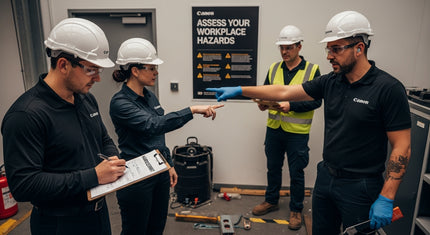
Tradesman courses are opening doors for people who want skills that pay off fast and lead to real jobs. Forget the old idea that only a four-year college degree can set you up for success. Trade school programs can often be finished in just 6 to 24 months, getting students into well-paying careers much sooner and at a fraction of the cost of university. Far from being a fallback, these hands-on courses are becoming some of the smartest moves for anyone looking to level up their career and earn more while doing practical, satisfying work.
Table of Contents
- Understanding Tradesman Courses And Their Benefits
- Popular Tradesman Courses For Different Professions
- How To Choose The Right Tradesman Course For You
- Tips For Success In Tradesman Training Programs
Quick Summary
| Takeaway | Explanation |
|---|---|
| Trade courses offer practical skills. | These programs focus on real-world applications, preparing students for immediate workforce entry in trades. |
| Choose courses based on personal strengths. | Conduct a self-assessment to align your abilities and interests with specific trade programs for better career satisfaction. |
| Evaluate program credentials. | Select accredited programs with recognized certifications to ensure quality education and industry relevance. |
| Balance technical and soft skills. | Cultivating interpersonal skills alongside technical expertise enhances competitiveness in the job market. |
| Invest strategically in your education. | Consider all financial aspects, including tuition and potential earnings, when selecting a tradesman course for long-term success. |
Understanding Tradesman Courses and Their Benefits
Tradesman courses represent strategic pathways for individuals seeking practical, skill-focused education that directly translates into career opportunities. These specialized training programs offer more than traditional academic routes, providing targeted education designed to prepare students for immediate workforce entry in technical and hands-on professions.
The Comprehensive Advantages of Trade School Training
Trade schools offer structured curricula that go beyond theoretical learning, emphasizing practical skills and real-world application. Unlike traditional four-year college programs, these courses are engineered to equip students with industry-specific knowledge and hands-on expertise that employers actively seek.
The financial advantages of trade school education are significant. According to industry research, these programs typically cost substantially less than university degrees while providing faster entry into well-paying careers. Students can complete most trade programs within 6-24 months, allowing them to start earning professional wages much earlier compared to traditional academic paths.

Specialized Training Across Multiple Trade Disciplines
Tradesman courses cover an extensive range of professional disciplines, including electrical work, plumbing, welding, automotive technology, HVAC systems, carpentry, and construction management. Each program is meticulously designed to provide comprehensive training that combines classroom instruction with practical workshop experiences.
Continuous learning remains crucial in trade professions. Professional development resources emphasize the importance of ongoing certifications, specialized workshops, and industry publications to help tradespeople stay current with emerging technologies and evolving workplace standards.
Career Progression and Long-Term Opportunities
Tradesman courses are not just entry-level training programs but strategic career investments. Many trade professionals find opportunities for specialization, entrepreneurship, and significant income growth. Skilled tradespeople often have multiple career pathways, including becoming independent contractors, starting their own businesses, or advancing into supervisory and management roles.
The demand for skilled trade professionals continues to grow across multiple industries. By selecting targeted trade skills training, individuals can position themselves in dynamic career fields that offer stability, competitive compensation, and opportunities for personal and professional development.
Understanding the nuanced benefits of tradesman courses reveals them as powerful educational strategies for those seeking practical, rewarding career paths that combine technical expertise with hands-on skills.
Popular Tradesman Courses for Different Professions
Tradesman courses offer diverse opportunities across multiple professional fields, providing specialized training that prepares individuals for dynamic and rewarding careers. These programs cater to various skill sets and industry demands, ensuring students can find a path that matches their interests and professional aspirations.
Electrical and Technical Trade Specializations
Electrical trade courses represent one of the most robust and in-demand training pathways. The Southeast Lineman Training Center exemplifies excellence in this field, offering comprehensive 15-week Electrical Lineworker Programs and 8-week Communications Lineworker Programs. These specialized courses train nearly 1,100 students annually, highlighting the significant demand for skilled electrical professionals.
Other critical electrical and technical trade courses include:
- Electrical Systems Installation
- Industrial Electrical Maintenance
- Renewable Energy Technologies
- Advanced Telecommunications Infrastructure
These programs combine theoretical knowledge with hands-on practical training, ensuring graduates are prepared for complex technical challenges in modern workplaces.
Construction and Building Arts Trades
Construction and building trades offer rich opportunities for individuals passionate about creating and maintaining physical structures. Williamson College of the Trades demonstrates the depth of educational possibilities in this sector, providing full scholarships and comprehensive programs in Carpentry, Machine Tool Technology, Masonry, and Landscaping.
Specialized courses in this domain include:
- Carpentry and Woodworking
- Advanced Construction Management
- Historic Building Restoration
- Sustainable Construction Techniques
The American College of the Building Arts further illustrates the sophistication of building trades education, offering specialized programs in Timber Framing, Architectural Carpentry, Blacksmithing, and Stone Carving.

Emerging and Specialized Trade Professions
Modern trade education extends beyond traditional fields, encompassing emerging technologies and specialized skill sets. Courses now address growing industries such as:
- Renewable Energy Systems Installation
- Advanced Manufacturing Technologies
- Green Building and Sustainable Design
- Robotics and Automation Maintenance
These innovative programs reflect the evolving nature of trade professions, preparing students for cutting-edge careers that blend technical expertise with creative problem-solving. Explore our comprehensive guide to trade gear to understand how professional attire complements these dynamic career paths.
The diversity of tradesman courses demonstrates the rich opportunities available for individuals seeking practical, skill-focused education. Whether interested in electrical work, construction, or emerging technologies, there is a specialized course designed to transform passion into a successful professional career.
To help you quickly compare the types of specialized tradesman courses available, here’s a summary table highlighting key professional fields and example programs covered in the article:
| Trade Field | Example Courses/Programs |
|---|---|
| Electrical & Technical Trades | - Electrical Systems Installation - Industrial Electrical Maintenance - Renewable Energy Technologies - Advanced Telecommunications Infrastructure |
| Construction & Building Arts Trades | - Carpentry and Woodworking - Construction Management - Historic Building Restoration - Sustainable Construction Techniques |
| Emerging & Specialized Professions | - Renewable Energy Systems Installation - Advanced Manufacturing Technologies - Green Building and Sustainable Design - Robotics & Automation Maintenance |
How to Choose the Right Tradesman Course for You
Selecting the ideal tradesman course requires careful consideration of personal goals, industry demands, and individual aptitudes. The right program can transform your career trajectory, providing a solid foundation for long-term professional success and personal growth.
Assessing Personal Skills and Career Objectives
Before enrolling in any trade program, conduct a thorough self-assessment of your natural abilities, interests, and career aspirations. Consider your strengths in technical skills, problem-solving, physical endurance, and manual dexterity. Each trade discipline demands unique capabilities, making it crucial to align your personal attributes with the specific requirements of your chosen field.
Key factors to evaluate include:
- Physical stamina and strength
- Mechanical aptitude
- Technical comprehension
- Interest in specific industry sectors
- Long-term career mobility potential
Below is a checklist table to help prospective students evaluate key personal factors when choosing a tradesman course, based on guidance provided in the article:
| Evaluation Factor | Recommended for Consideration? |
|---|---|
| Physical stamina and strength | Yes |
| Mechanical aptitude | Yes |
| Technical comprehension | Yes |
| Interest in industry sectors | Yes |
| Long-term career mobility | Yes |
Evaluating Program Credentials and Industry Standards
Credentials matter significantly in trade education. The Virginia Department of Professional and Occupational Regulation emphasizes the importance of selecting accredited programs that meet rigorous state standards. Look for courses that offer:
- State-recognized certifications
- Industry-standard curriculum
- Partnerships with professional organizations
- Opportunities for apprenticeships
- Comprehensive licensing preparation
Additionally, professional training resources highlight the significance of programs that incorporate current industry regulations and emerging technological standards. Modern trade education should prepare students not just for current job market demands but for future technological evolutions.
Financial Considerations and Career Investment
Choosing a tradesman course is a significant career investment. Consider multiple financial aspects beyond tuition, including:
- Program duration
- Potential earning potential
- Scholarship and financial aid opportunities
- Return on educational investment
- Costs of required tools and equipment
Check out our professional gear guide to understand the additional investments required in your chosen trade.
Successful trade professionals approach course selection as a strategic career decision. By carefully analyzing personal skills, program credentials, and financial implications, you can select a tradesman course that provides a robust pathway to a fulfilling and prosperous professional journey.
Tips for Success in Tradesman Training Programs
Training programs in the trades demand more than technical knowledge. Success requires a holistic approach that combines technical skills, professional development, and strategic personal preparation. Understanding the nuanced strategies for excelling in tradesman training can transform your educational experience and future career trajectory.
Mastering Technical and Soft Skills
The U.S. Department of Labor emphasizes that success in trade training extends beyond technical instruction. Developing a comprehensive skill set involves balancing hard technical abilities with critical soft skills such as communication, teamwork, and problem-solving.
Key skills to cultivate include:
- Active listening
- Effective communication
- Adaptability
- Time management
- Collaborative teamwork
- Critical thinking
These skills complement technical training, making you a more versatile and attractive candidate in competitive trade industries. Approach each training session as an opportunity to develop both your technical expertise and interpersonal capabilities.
Strategic Learning and Professional Development
Successful trade students approach their education with intentionality and strategic planning. This means going beyond classroom requirements and actively seeking additional learning opportunities. Engage with instructors, participate in workshops, and seek mentorship opportunities within your chosen trade.
Recommended strategies for maximizing your learning include:
- Taking detailed notes
- Asking targeted questions
- Participating in hands-on practice sessions
- Seeking additional certifications
- Networking with industry professionals
- Staying current with technological advancements
Building a Professional Foundation
Preparing for a successful trade career involves more than technical training. Developing a professional mindset and creating a strong personal brand are crucial. Learn how to dress for professional success by understanding the importance of appropriate workwear and professional presentation.
Additional professional development considerations:
- Maintain a professional portfolio
- Document your skills and achievements
- Develop a personal brand
- Stay committed to continuous learning
- Build a professional network
- Demonstrate reliability and consistency
Tradesman training programs offer more than technical education. They are transformative experiences that prepare you for a dynamic and rewarding career. By approaching your training with dedication, strategic thinking, and a commitment to holistic skill development, you can position yourself for long-term success in the trades.
Frequently Asked Questions
What are tradesman courses?
Tradesman courses are specialized training programs that focus on practical, skill-based education in various trade disciplines, such as electrical work, plumbing, carpentry, and HVAC systems.
How long does it usually take to complete a tradesman course?
Most tradesman programs can be completed within 6 to 24 months, allowing students to enter the workforce and start earning sooner compared to traditional college degrees.
What are the benefits of attending trade school?
Trade schools provide structured, hands-on education, lower costs compared to university degrees, faster career entry, and focused training that aligns with industry demands.
How do I choose the right tradesman course for my career goals?
Consider your personal interests and skills, evaluate program credentials and industry standards, and assess financial implications to find a tradesman course that aligns with your career objectives.
Gear Up for Your New Trade Career with Confidence
You have already started your path with top tradesman courses and hands-on training, but you know that stepping into a new skilled career is about more than knowledge. Real progress happens when you show up ready to work and dress the part. Many new and future tradespeople face the same challenges: finding apparel that matches the demands of your job, looks sharp, and feels comfortable all day on site. You want workwear that is as resilient and dependable as the skills you are building.

The right workwear can boost your confidence and make your transition from classroom training to real job sites smooth and professional. With WorkwearComfort.com, you get rugged, stylish apparel designed for hardworking tradesmen and women. Whether you need UPF 50+ sun protection or clothing that stands up to tough conditions, our women’s workwear collection and best-selling gear keep you prepared for every challenge. Now is the time to invest in yourself and your future. Explore our full range today and show everyone you are ready to build a legacy on and off the job.
Recommended
- Women in the Trades 2025: Durable Workwear and Strong Careers - WorkWear Comfort
- Top Trades Gear and Apparel for 2025: Rugged Choices - WorkWear Comfort
- Best Affordable Workwear Brands for Tough Jobs 2025 - WorkWear Comfort
- Best Workwear for Electricians: Top Choices for 2025 - WorkWear Comfort
- How to Train New Installers Using Aeoncut Tutorials Effectively – AEONCUT PPF Pre-cut Cutting software
- The AI Engineer Skill That Pays $50K More (And It’s Not What You Think)















































